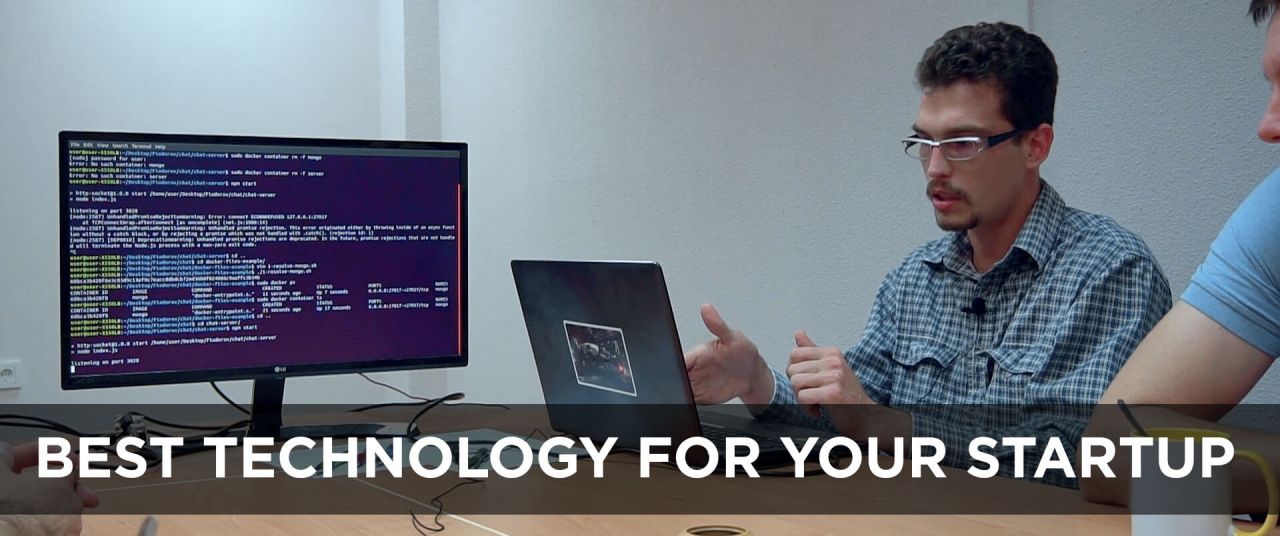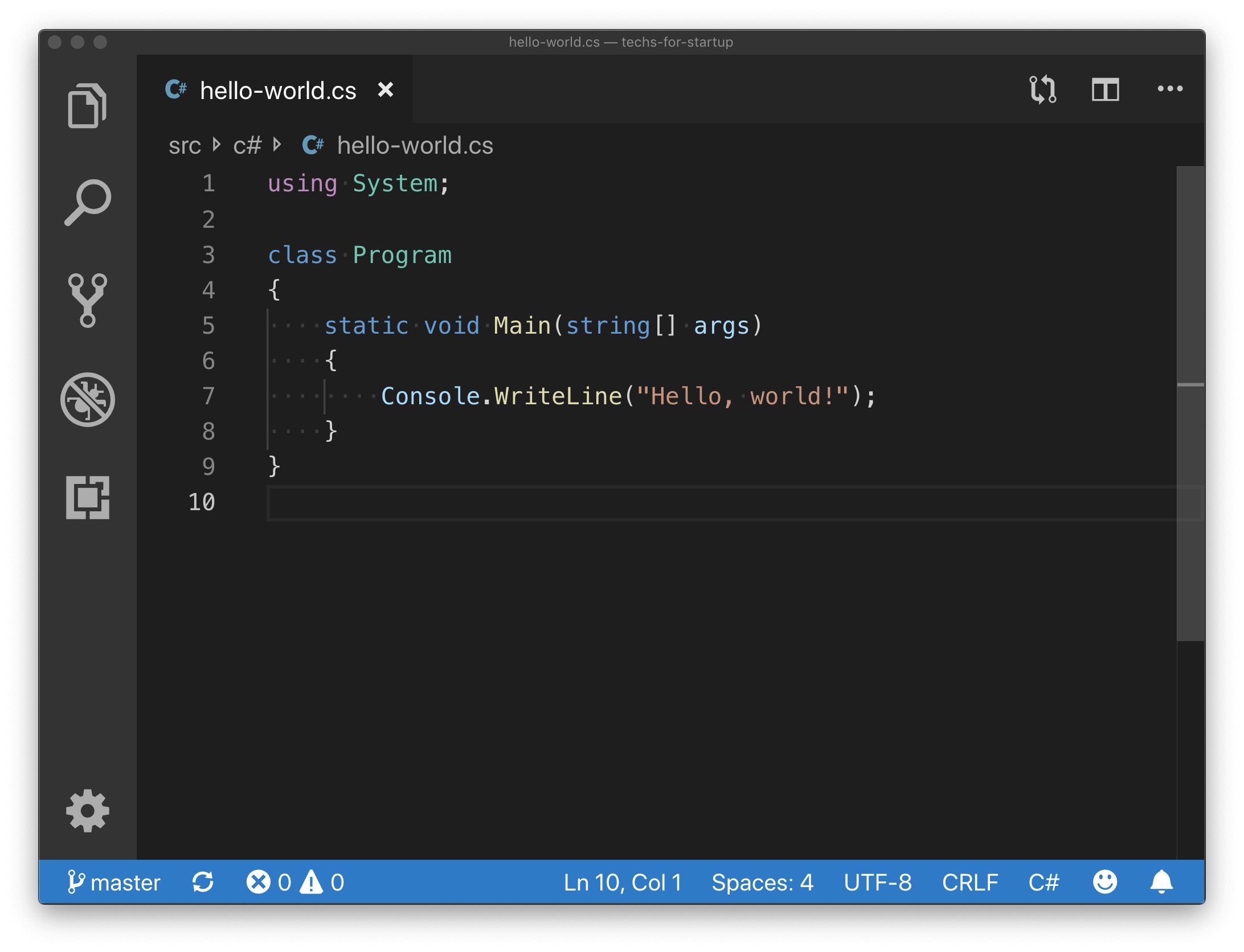Best Technology for Your Startup

This article will help you understand what is the best technology for your startup and how the options differ from each other. You will find out when it’s better to prefer scalability to speed and when you need to study a new technology rather than use the one you know.
What should influence your choice?
A startup is not only a brand-new idea and product. It is also little money, a lot of overtime work, difficulties in meeting deadlines, and the necessity to scale the project in the future. When deciding what programming language to use, the founders often don’t even consider the possibility of changing it someday.
Programming paradigm
Most likely you choose an object-oriented language. They are so popular because objects and methods can be imagined as nouns and verbs in real life. However, there is no standard realization of the paradigm—no one knows how to do it directly. This makes it rather flexible for the developers—everyone does it in their own way. Almost every language you consider is fully or partially object-oriented.
Problem fit
Every startup has a suitable programming language that will implement the idea efficiently. The best decision is to analyze what technologies similar apps use. Nevertheless, if you already have a team of developers, start with a language they are familiar with. If you are going to hire a team, remember that the newer the technology is, the fewer good employees there are in the market.
Determine the priorities of the development process. If you are short on time, choose the technologies that provide quick iterations. If there is no pressure from investors, then choose a scalable technology stack.
Performance
Talking about performance, garbage collection and concurrency are crucial when choosing a programming language.
Garbage collection consumes CPU and memory and can suspend program execution. Any language that has a garbage collector is a priori much better in terms of performance than those that don’t. Anyway, you can always use manual memory management provided by low-level languages when memory is a scarce resource for your startup.
Concurrency is a situation when some operations run during the same period. They are not necessarily executed together at the same time. Two threads executing in rotation is also an example of concurrency. It’s important to implement this idea because today processing power is physically constrained and it’s hard to make processors faster. This is the reason why the multicore processors appeared. It’s important to develop an app that will use the full potential of such processors.
Productivity
Productivity includes two main factors: the amount of existing reusable code and the speed of writing new code.
The amount of existing code depends on the popularity of the language. Popular technologies have bigger communities, hence more resources, more open-source libraries, and more developers you can hire. The more code that can be reused, the faster the process will go.
There are four aspects that influence the speed of creating new code:
- Experience. Try to combine the languages your team knows with the ones with good documentation and that are easy to learn.
- Feedback loop. How long it takes to see how the code change affects your product. If compiling or redeploying takes a few minutes, you will be less productive than if it took a few seconds to refresh the page or rerun the script. Look for languages that offer hot reload, fast compiling, and fast automated tests.
- Expressiveness. This is a measure of how many code lines are enough to perform an idea. The more code you need to write, the more bugs you will consequently need to fix.
- Difficulty. If the language you choose is appropriate by all previous factors but is very hard to learn, it’s not for you.
Technology review
Java/Spring
It is a general-purpose language for various applications that offers a wide range of options. Java includes APIs that help developers build complex projects. Android app development requires having a good command of Java. The platform continues improving and adding new features. The language itself is a very powerful instrument, but there are some drawbacks that make it inefficient to use Java in startups. For example, it uses a lot of memory and takes a long time to run the code on the Android emulator.
| Java features and characteristics | |
| Programming paradigm | Object-oriented, Structure, Imperative, Reflective, Functional, Component-oriented |
| Problem fit | Enterprise desktop software, embedded systems, desktop software, bank systems, big data programs, point of sale systems, Android apps |
| Apps & companies using it | Pinterest, eBay, LinkedIn, Gartner, IBM, Fitbit |
| Garbage collector | Built-in |
| Concurrency | Supported |
| Amount of existing code | Very much |
| Difficulty | Normal |
| TIOBE index rank | 1 |
| PYPL index rank | 2 |
| Created in | 1995 |

Spring’s core features let you develop any Java application and make it extensible. The Spring framework is mostly used for:
- Java Enterprise Edition apps
- Web applications
- Distributed applications
- Real-time apps
Python/Django
It is a server-side interpreted, open-source, non-compiled, scripting language. It can be used on its own or as a part of a framework, e.g., Django. A Python startup company can develop almost anything very fast. It is easy to learn and use, that’s why it is a very popular language to begin learning to program. Good libraries and functionality let Python startups build projects really fast. The only thing where Python is inappropriate is mobile development.
| Python features and characteristics | |
| Programming paradigm | Object-oriented, Reflective, Imperative, Aspect-oriented |
| Problem fit | Web development, manipulation and visualization, scientific computing, script writing and automation, back-end development, fast development and prototyping, artificial intelligence, big data, machine learning |
| Apps & companies using it | Instagram, YouTube, Spotify, Dropbox, Eventbrite |
| Garbage collector | Built-in + Global Interpreter Lock |
| Concurrency | Supported + Global Interpreter Lock |
| Amount of existing code | Much |
| Difficulty | Very easy |
| TIOBE index rank | 3 |
| PYPL index rank | 1 |
| Created in | 1991 |

Django is the best Python-based web development framework used by startups. It is good for creating projects working with large amounts of text, media files, and heavy traffic. The best uses of Python/Django for startups:
- Financial platforms with the possibility to analyze numeric data
- Custom CRM systems
- Shopping and booking platforms
- Property evaluation systems
- Document management systems
- Platforms for handling legal issues
- Social media websites
JavaScript/Node.js
This is a scripting language that was made for adding in-browser functionality to web pages. JavaScript is unique because it provides:
- Full integration with HTML/CSS
- Simple realization for simple things
- Default support by all common browsers
It is the only browser technology that combines these three features, and it explains the popularity and widespread use.
It is not recommended to use full stack JavaScript for startups with intensive computation and data processing. Number processing occupies the thread and makes the application unable to handle other requests, and this may cause critical delays.
| JavaScript features and characteristics | |
| Programming paradigm | Object-oriented, Functional, Imperative |
| Problem fit | Web development, web applications, server applications, web servers, flying robots programming, games, smartwatch apps, mobile apps, e-commerce solutions, real-time applications and services, admin panels |
| Apps & companies using it | PayPal, Netflix, Medium, Mozilla, Trello |
| Garbage collector | Built-in |
| Concurrency | Supported |
| Amount of existing code | Much |
| Difficulty | Easy |
| TIOBE index rank | 7 |
| PYPL index rank | 3 |
| Created in | 1995 |

Node.js is not really a framework, it is a JavaScript runtime environment. It transforms JavaScript from a specific language into a general-purpose one. The following list shows where startups can use JavaScript with Node.js:
- Server-side web applications
- Internet of Things
- I/O bound apps
- Data-streaming applications
- Data-intensive real-time applications
- JSON API-based applications
- Single page applications
- Robots and drones software
PHP/Laravel
PHP is a server-side scripting language for web development. It’s good at connecting websites to databases because it has native MySQL support. It’s convenient for the developer that PHP is embedded in HTML. PHP startups are famous for their security, easy maintenance, and good scalability.
| PHP features and characteristics | |
| Programming paradigm | Procedure, Object-oriented, Imperative |
| Problem fit | Server-side development, database-enabled web pages, web applications, database applications, e-commerce, project management tools, Facebook apps, generating PDF files, mailing lists, image processing and generation, content management systems, WordPress plugins |
| Apps & companies using it | NEXT, 9GAG, Startups.co, Laracasts.com, Globaldietarydatabase.org |
| Garbage collector | Built-in + Automatic Reference Counting |
| Concurrency | Supported |
| Amount of existing code | Much |
| Difficulty | Easy |
| TIOBE index rank | 8 |
| PYPL index rank | 5 |
| Created in | 1994 |

Laravel is an open-source PHP web-framework with a simple and expressive syntax. It is a good choice for different startups:
- Web applications
- Software as a service apps
- Business solutions
- Microservice systems
- Online portals with search functionalities
- Custom e-commerce applications
- Hotel or school management systems
- Booking websites
Ruby/Ruby on Rails
Ruby is an open-source, object-oriented, general-purpose scripting language. It is a well-balanced combination of LISP, Smalltalk, Ada, Perl, and Eiffel languages. Its syntax resembles Perl and Python. Use Ruby for a startup to make development less complex for programmers. But be careful while scaling the startup in Ruby because you can have some trouble with server overload.
| Ruby features and characteristics | |
| Programming paradigm | Object-oriented, Reflective, Imperative, Functional |
| Problem fit | Web development, database work, system utilities, backups, parsing, machine learning, robotics, artificial intelligence, fast development and prototyping, security |
| Apps & companies using it | Twitter, Github, Couchsurfing, Shopify, Aliexpress |
| Garbage collector | Built-in + Global Interpreter Lock |
| Concurrency | Supported + Global Interpreter Lock |
| Amount of existing code | Enough |
| Difficulty | Easy |
| TIOBE index rank | 13 |
| PYPL index rank | 12 |
| Created in | 1995 |

Ruby on Rails is a perfect choice for any type of web application startup. This framework is a part of the tech stack of many successful technology startups. A Ruby on Rails startup company can create:
- Enterprise systems
- Search engines
- Services with high traffic
- Social networks
- Auction websites
- Online shopping stores
C++/Qt
C++ is created as an extension of C. Unlike C, it is an object-oriented language. C++ is considered to be the most efficient choice for developing large-scale startups. Despite a steep learning curve, being fluent in C++ gives you benefit over other developers. Choosing C++ for your startup gives you the opportunity to use computer power efficiently.
| C++ features and characteristics | |
| Programming paradigm | Procedure, Object-oriented, Functional |
| Problem fit | Efficient memory management, smooth real-time execution, 3D video games, graphical apps, creating operating systems, desktop programs, interaction with hardware at a low level, web services |
| Apps & companies using it | Telegram Desktop, Autodesk Maya, Google Earth, VLC Media Player |
| Garbage collector | Manual memory management |
| Concurrency | Supported |
| Amount of existing code | Much |
| Difficulty | Hard |
| TIOBE index rank | 4 |
| PYPL index rank | 6 |
| Created in | 1979 |

Qt is a multipurpose framework with a GUI tool kit supported by all popular platforms. Qt is suitable for startups that develop:
- Embedded software
- Internet of Things
- Mobile applications
- Automation systems
- Consumer electronics
- Multimedia processing programs
- Communication tools and messaging services
- File sharing systems
- 3D graphics tools
- Games
C#/.NET
C# is a type-safe object-oriented language based on C and C++. It was created as the official language of the .NET framework to increase development speed and to make it easier. Any .NET code runs in Windows, so C# is an official Windows development language. It has a huge number of libraries to solve various problems of startups. However, it’s not the best language to start getting acquainted with programming, there are some simpler alternatives.
| C# features and characteristics | |
| Programming paradigm | Object-oriented |
| Problem fit | Windows applications, workflow automation, enterprise and business apps, web apps, web services, creating games, building native mobile apps using Xamarin framework, blockchain, artificial intelligence |
| Apps & companies using it | Microsoft Office, Skype, Photoshop, Slack, The World Bank, Alaska Airlines |
| Garbage collector | Built-in |
| Concurrency | Supported |
| Amount of existing code | Much |
| Difficulty | Normal |
| TIOBE index rank | 6 |
| PYPL index rank | 4 |
| Created in | 2000 |

.NET framework is a platform developed by Microsoft for Windows-based operating systems. You may use .NET for several types of startups:
- Web applications
- Desktop & mobile applications for Windows
- Real-time applications
- Video games
- Windows store apps
Swift for iOS
Swift is a language designed by Apple to implement the concepts of Objective-C but in a safer way. Comparing to Objective-C, Swift is much easier to read, write, and maintain. It provides safety, speed, and expressiveness that C-based languages lack.
Choose this language for a startup if you are going to develop products for macOS and iOS. One more thing you should know—all your Swift developers will need Apple devices.
| Swift features and characteristics | |
| Programming paradigm | Protocol-oriented, Object-oriented, Functional, Imperative |
| Apps & companies using it | Nodes (Ironman, Mazda product catalog, MAN Energy Solution internal app for quality assurance), N26 |
| Problem fit | Apps for macOS, iOS, watchOS, tvOS, Linux, modern server apps |
| Garbage collector | Automatic Reference Counting |
| Concurrency | Supported + Grand Central Dispatch |
| Amount of existing code | Enough |
| Difficulty | Easy |
| TIOBE index rank | 11 |
| PYPL index rank | 9 |
| Created in | 2014 |

Kotlin for Android
Kotlin is a modern statically typed language for Android development. It was meant to be a new programming language that would be more type-safe than Java and easier than Scala. As a result, Kotlin is fully compatible with Java Virtual Machine and Java itself, so Java developers can gradually move to this technology.
Comparing to Java as the closest rival, Kotlin offers a lot of new features and advantages. It helps reduce the amount of code, minimizes errors, provides null safety and faster loading. Thanks to these benefits, Kotlin became the number one choice for creating Android applications.
| Kotlin features and characteristics | |
| Programming paradigm | Object-oriented, Functional |
| Apps & companies using it | Pinterest, Basecamp, Keepsafe App Lock, Gradle, Coursera, Corda |
| Problem fit | Android development, web applications, server-side development, desktop development |
| Garbage collector | Built-in |
| Concurrency | Supported (coroutines) |
| Amount of existing code | Not much |
| Difficulty | Normal |
| TIOBE index rank | 40 |
| PYPL index rank | 13 |
| Created in | 2011 |

Summary
There are a great variety of programming languages, but only a few of them are efficient and easy enough to solve the problems of startups. We studied nine technologies which are on the top of the popularity lists according to PYPL and TIOBE indexes:
- Java
- Python
- JavaScript
- C#
- C++
- PHP
- Ruby
- Swift
- Kotlin
You can easily choose the best technology for your startup by its key features. For example, your company is going to develop an ERP system for a large organization. Suitable technologies for enterprise development startups are Java/Spring, C#/.NET, JavaScript/Node.js, and PHP/Laravel. If your developers prefer statically typed languages, you should choose between Java and C#. And if the team has some experience in Java and worked with its frameworks, it would be the best choice for your startup.
If, after checking all the criteria, there is more than one option, then analyze your additional requirements, such as security, data processing, testing possibilities, and whatever you consider important.
If you are looking for an experienced team to develop your startup idea, feel free to contact us.





sowmyasri says:
It’s good to know about this, thanks for sharing the informative article…
Rick Sorkin says:
Thank you for a great article! It can really help, if you don’t know exactly which tecnology to use in your startup. Based on my experience I can say that the right selected technology saves you a lot of TIME and MONEY.
sowmyasri says:
Very clear explanation, needful article…
Tony says:
Nice article